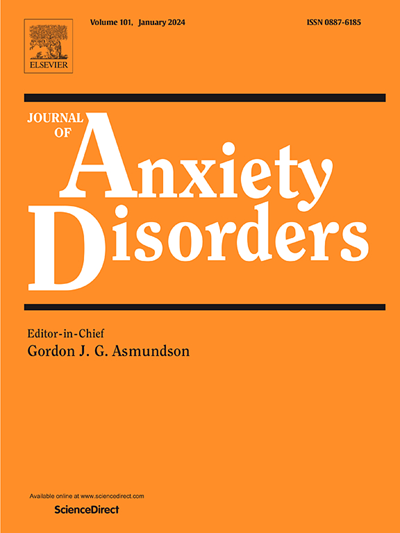Why do individuals with generalized anxiety disorder and depression engage in worry and rumination? A momentary assessment study of positive contrast enhancement
IF 4.5
2区 医学
Q1 PSYCHIATRY
引用次数: 0
Abstract
The contrast avoidance model suggests that individuals with generalized anxiety disorder (GAD) use worry to sustain negative emotionality and thus avoid a sharp increase in negative emotion. Maintenance of negative mood increases the probability of subsequent decreased negative and increased positive affect (positive emotional contrast; PEC) when worrisome outcomes are better than expected. However, occurrence of PECs via increased positive affect and its application to rumination are unclear. Using a momentary assessment design, we examined effects of worry/rumination on PECs associated with relief and positive events. Participants with GAD and/or major depressive disorder (MDD; N = 76), or without psychopathology (N = 85) rated the occurrence of relief and positive events, emotions, and repetitive thought 8x/day for 8 days. Higher vs. lower worry and rumination were associated with greater decreased anxiety and sadness, and greater increased happiness pre-to-post positive and relief events. Greater GAD and MDD symptoms predicted ongoing higher ratings on intentionally thinking pessimistically to be pleasantly surprised if something good happened. Results suggest that worry/rumination led to enhanced PECs via decreased negative and increased positive affect pre-to-post positive and relief events. Individuals with higher GAD and depression symptoms reported intentionally using worry/rumination to increase PECs in daily life.
为什么患有广泛性焦虑障碍和抑郁症的人会担心和沉思?正面对比增强的瞬间评估研究
对比回避模型表明,广泛性焦虑障碍(GAD)患者使用担忧来维持负面情绪,从而避免负面情绪的急剧增加。消极情绪的维持增加了随后消极情绪减少和积极情绪增加的可能性(积极情绪对比;当令人担忧的结果好于预期时。然而,PECs是否通过积极情绪的增加而发生及其在反刍中的应用尚不清楚。使用瞬间评估设计,我们检查了担忧/沉思对与缓解和积极事件相关的PECs的影响。广泛性焦虑症和/或重度抑郁症(MDD)患者;N = 76),或无精神病理(N = 85)对缓解和积极事件、情绪和重复思维的发生进行评分,每天8次,持续8天。忧虑和沉思程度的高低与焦虑和悲伤程度的降低有关,与积极和缓解事件前后的幸福感增加有关。更严重的广泛性焦虑症和重度抑郁症症状预示着,如果好事发生,故意悲观思考的人会得到更高的评分。结果表明,焦虑/反刍通过减少消极情绪和增加积极情绪导致PECs的增强。据报道,有较高广泛性焦虑症和抑郁症状的个体在日常生活中故意使用担忧/反刍来增加PECs。
本文章由计算机程序翻译,如有差异,请以英文原文为准。
求助全文
约1分钟内获得全文
求助全文
来源期刊

Journal of Anxiety Disorders
Multiple-
CiteScore
16.60
自引率
2.90%
发文量
95
期刊介绍:
The Journal of Anxiety Disorders is an interdisciplinary journal that publishes research papers on all aspects of anxiety disorders for individuals of all age groups, including children, adolescents, adults, and the elderly. Manuscripts that focus on disorders previously classified as anxiety disorders such as obsessive-compulsive disorder and posttraumatic stress disorder, as well as the new category of illness anxiety disorder, are also within the scope of the journal. The research areas of focus include traditional, behavioral, cognitive, and biological assessment; diagnosis and classification; psychosocial and psychopharmacological treatment; genetics; epidemiology; and prevention. The journal welcomes theoretical and review articles that significantly contribute to current knowledge in the field. It is abstracted and indexed in various databases such as Elsevier, BIOBASE, PubMed/Medline, PsycINFO, BIOSIS Citation Index, BRS Data, Current Contents - Social & Behavioral Sciences, Pascal Francis, Scopus, and Google Scholar.
 求助内容:
求助内容: 应助结果提醒方式:
应助结果提醒方式:


